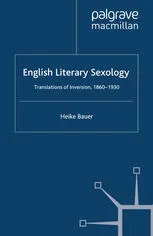English Literary Sexology: Translations of Inversion, 1860–1930
4.0
Reviews from our users

You Can Ask your questions from this book's AI after Login
Each download or ask from book AI costs 2 points. To earn more free points, please visit the Points Guide Page and complete some valuable actions.Welcome to the introduction of English Literary Sexology: Translations of Inversion, 1860–1930, a meticulously researched work exploring the intersections of literature, sexology, and cultural history. Penned by Heike Bauer, this book offers a critical lens through which to understand how the concept of "sexual inversion" shaped English literature and thought during a transformative era in history. From breakthroughs in medical discourse to the literary interpretations that redefined cultural norms, this work provides a comprehensive analysis of one of the most fascinating periods in intellectual history.
Detailed Summary of the Book
Spanning the decades between 1860 and 1930, English Literary Sexology examines the intellectual and cultural evolution of the concept of "inversion"—a term used in early sexological literature to describe homosexuality and non-normative gender expressions. At its core, the book addresses the way sexology and literary practice converged to forge new discourses about identity and sexuality. Bauer delves into how translations and interpretations of notions like inversion from Continental Europe—especially the work of seminal figures such as Karl Heinrich Ulrichs and Richard von Krafft-Ebing—came to influence the English-speaking world's literary and medical fields.
This exchange of ideas did more than merely import scientific concepts into British culture; it altered the way writers like Oscar Wilde, Radclyffe Hall, and others conceptualized human relationships, social conformity, and artistic expression. Bauer highlights critical literary texts and demonstrates their role as active participants as well as reflections of broader sexological debates. By weaving together literature and science, the book effectively deciphers how fin-de-siècle and Modernist authors understood, resisted, and appropriated these evolving ideas.
Key Takeaways
- Intersection of disciplines: The book unpacks how literature and sexology informed each other during a pivotal historical period, establishing a connection between medical theories and artistic expression.
- Impact of translation: Bauer focuses on the nuances of translation, showing how the migration of ideas from German and French sexologists into English texts transformed not just literary works but social attitudes toward sexuality and gender.
- Debating inversion: Through analysis of seminal works, Bauer reveals the contested and multidimensional nature of "inversion," moving beyond its medical definition to demonstrate its cultural and literary ramifications.
- Historical importance: The book elegantly demonstrates why this era remains a cornerstone in understanding sexual identity and representation in modern cultural narratives.
Famous Quotes from the Book
"English literary sexology was never merely about inward reflection or artistic creativity—it was about social negotiation, reshaping the boundaries between conformity and individuality."
"The concept of inversion brought to literature the possibility of exploring human experience at its margins, challenging and sometimes dismantling the foundational narratives of sexuality and respectability."
"Translation is not neutral; it serves as an active agent of transformation, embedding foreign concepts into the fabric of English thought and culture."
Why This Book Matters
The significance of English Literary Sexology lies in its interdisciplinary approach and its ability to shed light on neglected histories of sexual and literary discourse. Bauer’s work is essential for scholars in fields such as literature, gender studies, cultural history, and medical humanities. By tracing the genealogy of ideas surrounding inversion, the book offers readers new perspectives on not only English literature but also the broader historical context that shapes modern understandings of sexuality.
Furthermore, the book underscores the importance of translation as a cultural phenomenon. It reveals that movements of ideas across language barriers can profoundly alter a society's intellectual framework. The influence of sexological theories on literature in English is a testament to the enduring power of interdisciplinary thought, making Bauer's work a vital contribution to academic scholarship and cultural history.
In a world where conversations about gender and sexuality continue to evolve, English Literary Sexology is a timely reminder of where these discussions began and how far they have come.
Free Direct Download
Get Free Access to Download this and other Thousands of Books (Join Now)
For read this book you need PDF Reader Software like Foxit Reader
Accessing books through legal platforms and public libraries not only supports the rights of authors and publishers but also contributes to the sustainability of reading culture. Before downloading, please take a moment to consider these options.
Find this book on other platforms:
WorldCat helps you find books in libraries worldwide.
See ratings, reviews, and discussions on Goodreads.
Find and buy rare or used books on AbeBooks.


